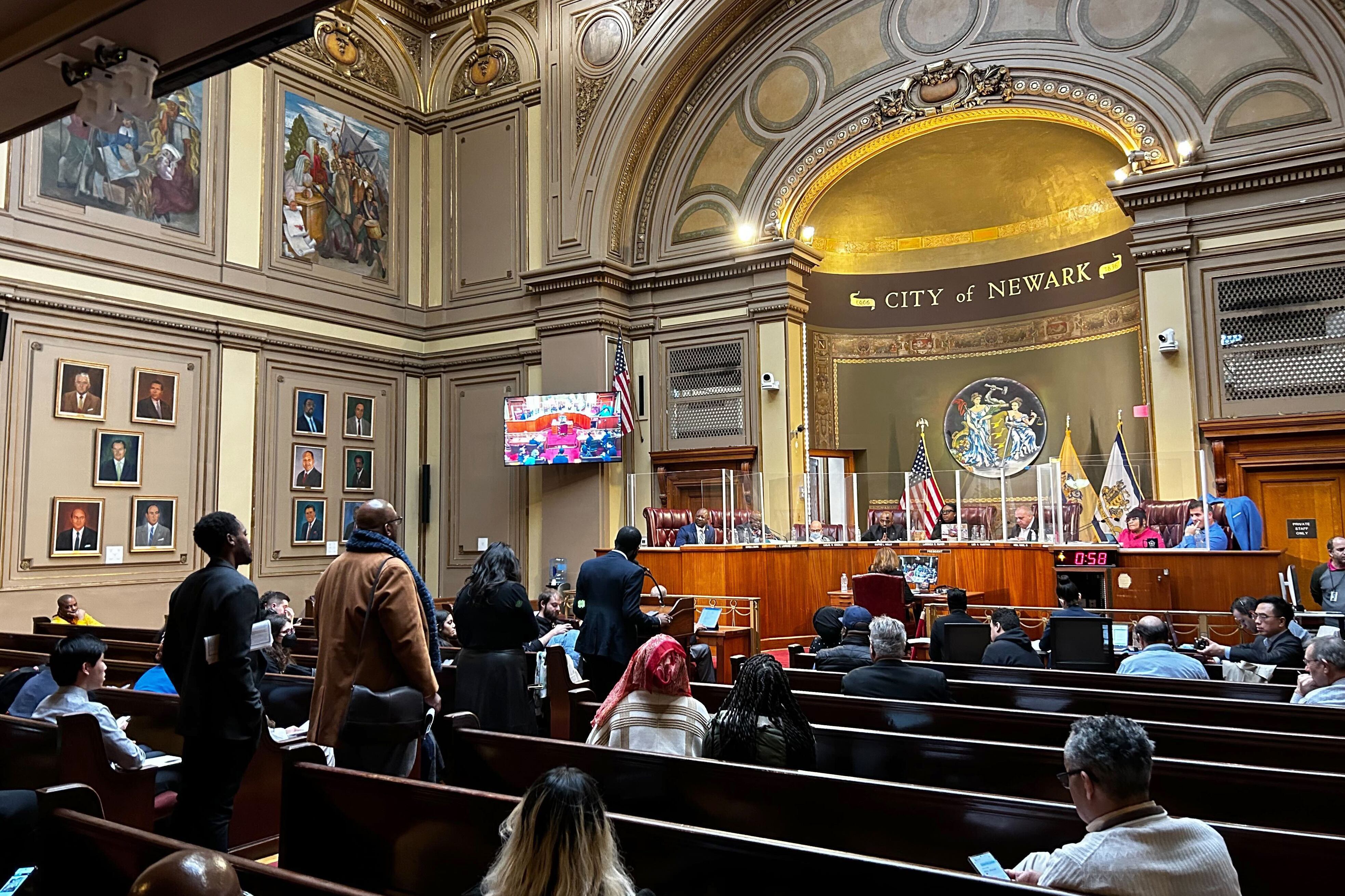Sign up for Chalkbeat Newark’s free newsletter to keep up with the city’s public school system.
Newark’s 16- and 17-year-olds will be allowed to vote in April’s school board election after city leaders voted unanimously in favor of a historic ordinance to lower the voting age.
The city will be the first in the state to lower the voting age to 16 for school board elections. The ordinance, sponsored by council president LaMonica McIver, stems from McIver’s desire to engage in civics as a 16-year-old after being inspired by her fifth grade teacher, Ras Baraka, who is now the mayor of Newark.
“I decided to run for an elected position because of those lessons my teacher taught me,” said McIver during a press conference following Wednesday’s council meeting.
Before the vote, state and community leaders, educators, and students spoke at the packed city council meeting about the importance of letting young people vote, while others highlighted their concerns during public comment, which ran about 90 minutes. Some residents commented on the importance of letting the city’s youth vote in “decisions that affect their day-to-day,” bringing back civics courses to the public schools, and engaging high school students with civic actions.
During the council meeting, Nathaniel Esubonteng, a 16-year-old junior at Science Park High School and fellow for the nonprofit The Gem Project, called himself an engaged student and said he feels confident that his peers are prepared to vote. After the board vote, he recalled going to a school board candidate forum and being disappointed that he wouldn’t be able to participate in the election.
“We really align with these people but do we get to vote? We were able to listen to everything they had to say and align our values but we couldn’t vote, so that was very unappealing,” Esubonteng said.
Breanna Campbell, also a 16-year-old junior at Science Park High School and fellow for The Gem Project, said she felt urgency and excitement for the opportunity to vote.
“It honestly feels good for this law to be passed because it shows how our voices make a difference,” Campbell said.
The new ordinance comes after New Jersey Gov. Phil Murphy recently signed to allow 17-year-olds to vote in primary elections if they are registered and turning 18 by the general election, starting in 2026. In his annual State of the State address on Tuesday, Murphy also asked state lawmakers to send him a bill that would expand voting rights for 16- and 17-year-olds statewide to vote in local school board elections.
The Newark ordinance also comes as the city’s school board works to fill two vacancies, one left by former president Asia Norton, who abruptly resigned last September, and the other by board member A’Dorian Murray-Thomas, who won a seat on the Essex County Board of Commissioners in November.
McIver, the city council president, said her team along with the New Jersey Institute for Social Justice have met with Newark Public Schools and are looking for ways to collaborate with the school district to create civic awareness among students. She said there is a possibility “to do workshops with students and their parents.”
Once Baraka signs the ordinance into law, the city plans to meet with the state delegation to encourage them to implement civics education into the curriculum.
During Wednesday’s meeting, some council members expressed support for the ordinance while others shared their concerns with lowering the voting age and about immigrant teenagers who will not benefit from the new ordinance.
“These 16- and 17-year-olds, although they’re not American citizens, need to have their voices heard too,” said East Ward council member Michael Silva, who suggested addressing the voting rights of immigrants in his ward and throughout the city.
Other council members, including Anibal Ramos and Luis Quintana, raised concerns about the future of voter turnout and the importance of engaging young people in Newark. Over the last few years, turnout for the city’s school board election has hovered around 3%.
“This is a victory in increasing who is eligible to vote but if we are not able to effectively engage these young people, the 3% almost every speaker alluded to, could be 2% or 1% in the future because you’re increasing who can vote,” Ramos said.
Council member Carlos Gonzalez also cited concerns about a “slippery slope” of lowering the voting age.
“Isn’t 16 arbitrary? Or are we saying now 16 and next year it’s 14? It’s a slippery slope of going from 18 to 16,” said Gonzalez, who voted in favor of the action on Wednesday despite his concerns.
Despite the reservations, council leaders agreed city students should have a say in school board elections, which directly affect their day-to-day education, they said.
In response to comments about the cons of lowering the voting age, Jonathan Alston, a Science Park High School teacher and debate coach said 16-year-olds should not have stricter barriers than adults when it comes to the right to vote.
“Let’s not hold our 16-year-olds to a higher standard,” said Alston during the meeting.
Lawrence Hamm, chairman of the People’s Organization for Progress, and the first student representative for the Newark Board of Education, expressed his support for the ordinance but encouraged the council to pass a resolution urging the State Board of Education to restore civics as a required part of curriculum throughout New Jersey.
“During the 1980s, that decision to no longer require civics as a part of the curriculum happened,” Hamm said. “We can see today the dire consequences that has made.”
The Newark Board of Education election will be held on April 16. The voter registration deadline for the election is March 26.
Jessie Gómez is a reporter for Chalkbeat Newark, covering public education in the city. Contact Jessie at jgomez@chalkbeat.org.






